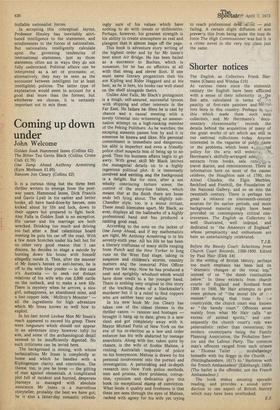Coming up down under
John Welcome
Golden Soak Hammond Innes (Collins £2) The Bitter Tea Gavin Black (Collins Crime Club £1.70) One Jump Ahead Anthony Armstrong (Eyre Methuen £1.95) Ransom Jon Cleary (Collins £2) It is a curious thing but the three best thriller writers to emerge from the postwar years, Hammond Innes, Dick Francis and Gavin Lyall in his earlier and better books, all have hard-done-by heroes, men kicked about by life and luck, down to their uppers but prepared to fight back. Alec Falls in Golden Soak is no exception. His career and his marriage are both wrecked. Drinking too much and driving too fast after a final calamitous board meeting he puts his car off the road. With a few more Scotches under his belt but for no other very good reason that I can discern, he decides to stage a suicide by burning down his house with himself allegedly inside it. Then, after the manner of Mr Innes's heroes or anti-heroes, he is off to the wide blue yonder — in this case it's Australia — to seek out distant relatives of his wife who run 3,000 cattle on the outback, and to make a new life. There is mystery when he arrives, a nice girl, unhappiness, an abandoned mine, and a lost copper lode, ' McIlroy's Monster' — all the ingredients for high adventure which Mr Innes knows so well how to exploit.
In his last novel Levkas Man Mr Innes's reach appeared to exceed his grasp. There were longueurs which should not appear in an adventure story however lofty its aim, and some of the archaeological detail seemed to be insufficiently digested. No such criticisms can be levied here.
The background is mining, with whose technicalities Mr Innes is completely at home and which he handles with a Kiplingesque clarity and conviction. The theme, too, is one he loves — the pitting of man against elementals. A complicated plot full of incident and hurried, desperate journeys is managed with absolute assurance. Mr Innes is a marvellous storyteller, probably the best we have got; he is also a latter-day romantic refresh ingly sure of his values which have nothing to do with trends or shibboleths. Perhaps, however, his greatest strength is his ability to create atmosphere so real and plangent that it almost leaps off the page.
This book is adventure story writing of the highest order and by far Mr Innes's best since Air Bridge. He has been hailed as a successor to Buchan, which is nonsense, for he has no affinities at all with that smug and clever Scot. If one must name literary progenitors then his are Kipling and Rider Haggard and at his best, as he is here, his books can well stand on the shelf alongside theirs.
Unlike Alec Falls, Mr Black's protagonist is a tough, self-assured, successful tycoon with shipping and other interests in the Far East. No failure he. Here he is cast by chance and a casual meeting with •a lovely Oriental into witnessing an assassination attempt on a high-ranking member of the Peking Politburo. As he watches, the escaping assassin passes him by and it is someone he knows and likes. His personal commitment is immediate and dangerous; his alibi is imperfect and even a friendly police chief suspects him of being up to no good. Then his business affairs begin to go awry. With great skill Mr Black latches the managerial details on to a highly ingenious political plot. It is immensely involved and exciting and the background is a delight. But for once, after a not wholly convincing torture scene, the control of the story-line falters, which means that at the finish there are loose ends left lying about. The slightly subChandler style, too, is a minor irritant, These small blemishes apart, Mr Black, as ever, displays all the hallmarks of a highly professional hand and has produced a rattling good read.
According to the note on the jacket of One Jump Ahead, and if my mathematics are right, Mr Anthony Armstrong is in his seventy-sixth year. All his life he has been a literary craftsman of many skills ranging from Punch and the New Yorker to long runs on the West End stage, taking in suspense and children's stories, country matters and the immortal Pilot Officer Prune on the way. Now he has produced a neat and sprightly whodunit which would have done credit to a far younger hand. There is nothing very original in this story of the tracking down of a blackmailer's murderer but it is a relief to find coppers who are neither bent nor sadists In his new book Mr Jon Cleary has taken one of the oldest themes in the thriller canon — ransom and hostages — brought it bang up to date, given it a new slant and got completely away with it. Mayor Michael Forte of New York on the eve of his re-election as a law and order enforcer has his wife abducted by teenage anarchists. Along with her, taken quite by chance, is the wife of Scobie Malone, a visiting Australian inspector of police on his honeymoon. Malone is drawn by his personal involvement into the pursuit and investigation. A painstaking and in-depth research into New York police methods, men and prisons, their problems, corrup tion, cynicism and dedication give this book its exceptional stamp of conviction.
What lends it quality and freshness is that these are seen through the eyes of Malone, racked with agony for his wife yet trying to reach professional deit 11ict — and failing. A certain slight diffusion of aim prevor ts this from being quite the tour de force The High Commissioner was but it is a crime novel in the very top class just the same.


































 Previous page
Previous page